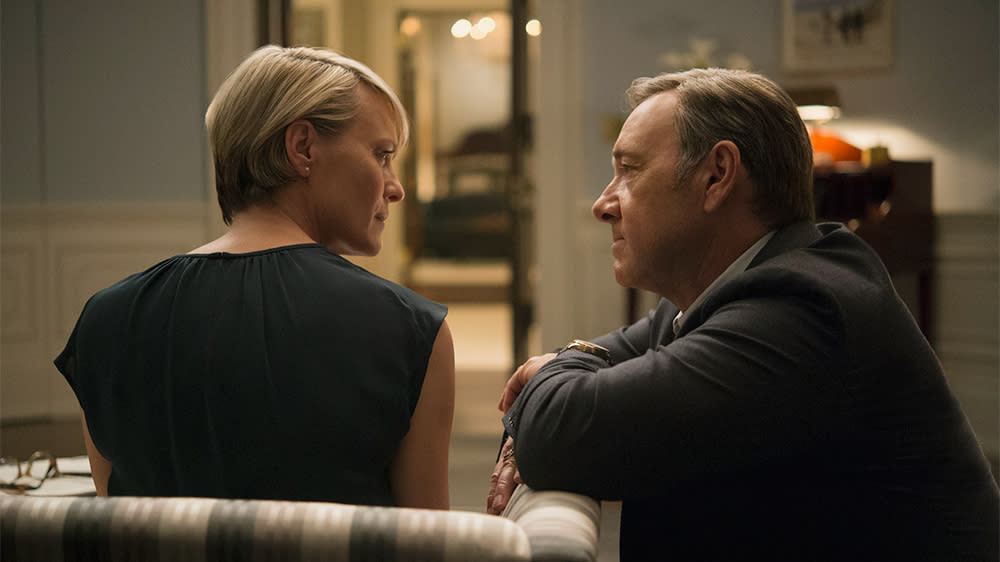TV Review: ‘House of Cards,’ the Complete Third Season (SPOILERS)

As it turns out, there was a simplicity to the third season of “House of Cards” that only became fully apparent once it ended. Having spent two seasons in pursuit of power, the central couple – now the President and First Lady – found a whole new set of complications and challenges in retaining it. Yet that was actually less fundamental to the story than the evolution of two key relationships, leading in opposite directions. All told, the net result proved more satisfying than season two, despite various missteps along the way.
“House of Cards” gets enough things right that it’s perhaps more glaring when the series gets them wrong – something that again happened periodically in season three (and SPOILER ALERT if you haven’t watched all 13 episodes), especially in regard to the politics.
Among the plot lines and sequences that went well beyond dramatic license, it’s simply impossible to imagine a political operator as skilled as now-President Francis Underwood (Kevin Spacey) using a recess appointment to name his wife, Claire, (Robin Wright) ambassador to the United Nations after the Senate rejected her, given the blowback that would unleash.
Ditto for tapping FEMA funds to push through his jobs program, which despite possessing a certain wonkish creativity was out-there enough that the disaster-relief agency felt obliged to object.
Similarly, the three-way presidential debate staged in one of the later episodes was dramatic, but also such an absurd mud-slinging free-for-all as to have scant foundation in reality. At least when “The West Wing” featured a debate in which the candidates abruptly agreed to throw out the carefully negotiated rules, that was steeped in flag-waving fantasy – here’s how things should be, not how they are – a frequent conceit within that NBC series.
These moments requires a fair suspension of disbelief, and undercut the political part of a season that did prove prescient in some respects, pitting the Underwoods against obstacles to their power in the form of not just people but the structural roadblocks that thwart attempts to actually govern. The ripped-from-the-headlines crises included run-ins with a bellicose Russian leader, Israel, a natural disaster and a Congress even more inept than its real-world counterpart.
Even so, one can consider the series a compelling — yes, even binge-worthy — serialized drama and still agree with Alyssa Rosenberg, who, writing in the Washington Post, dubbed the show “muddled and naïve.”
In the be-careful-what-you-wish-for dept., Underwood neatly summed up the frustrations associated with occupying the Oval Office by saying, “Sometimes I think the presidency is the illusion of choice.”
All of that, however, really wound up being secondary to the drama surrounding those aforementioned relationships: Frank and Claire, who were ultimately torn asunder (or left hanging that way); and Frank and Doug (Michael Kelly), his much-abused and wounded (both spiritually and physically) right-hand man, who spent the entire season earning his way back into the President’s good graces, even if that meant finally sacrificing a major part of himself to get there.
Showrunner Beau Willimon structured the season around those two arcs, which also gave a larger purpose to the biographer (Paul Sparks) who Underwood had enlisted to write a book about him. The writer’s project ultimately became a paean to the Frank-Claire political partnership, which only helped crystallize its shortcomings in her mind.
More subtly, the near-absence of sex in this year’s episodes reinforced the pragmatic nature of their marriage, expressed a little too directly when Claire confronted Frank in the final chapter.
“Without me, you are nothing,” Frank told her bluntly in a fit of pique. Yet as the build-up to that scene made clear – with Frank and his aides sweating out the optics of a public appearance without Claire at his side – their bond is more symbiotic than he would freely admit.
Finally, given the misgivings initially expressed here after viewing six of the 13 episodes – that “House of Cards” wasn’t as interesting now that Underwood had completed his ascent to the White House – a few thoughts need to be updated.
In response to that earlier review suggesting two seasons culminating with Underwood becoming president would have been enough, some responded by noting that the show’s 1990s British predecessor ran three cycles, which seems completely beside the point. Because while this U.S. version obviously borrowed that template, comparisons between them have grown flimsy, since there’s so much specificity wrapped up in the current state of American politics that this 21st-century construct has very much assumed a life of its own.
In addition, watching the entire season further enhanced a sense that as good as it is, “House of Cards’” significance is overrated – a reference less to quality than its cultural footprint. That’s largely a byproduct of the inside-the-Beltway subject matter and the clever inclusion of media figures such as NBC’s Chuck Todd, CNN’s John King and Stephen Colbert, which deftly plays to the media and Washington’s narcissistic impulses but, given the criticisms cited above, only magnify the flaws.
So while the assertion that this Netflix series could have been brought to a conclusion once Underwood achieved his goal stands, now that the third season and its cliffhanger finish are over, the loose ends leave several potentially fertile plots awaiting resolution. And after all the pawns Frank felled in playing his elaborate chess game, in resetting the board “House of Cards” had the good sense to shrewdly focus on its king, queen and one particularly conflicted knight.
Related stories
Netflix Inks Global Deal with FremantleMedia for Supernatural Thriller 'The Returned'
Netflix Exec Says It Didn't Actually Want FCC to Regulate Broadband So Heavily
Kyle Chandler, Ben Mendelsohn Thrill in Netflix Drama Series 'Bloodline'
Get more from Variety and Variety411: Follow us on Twitter, Facebook, Newsletter

